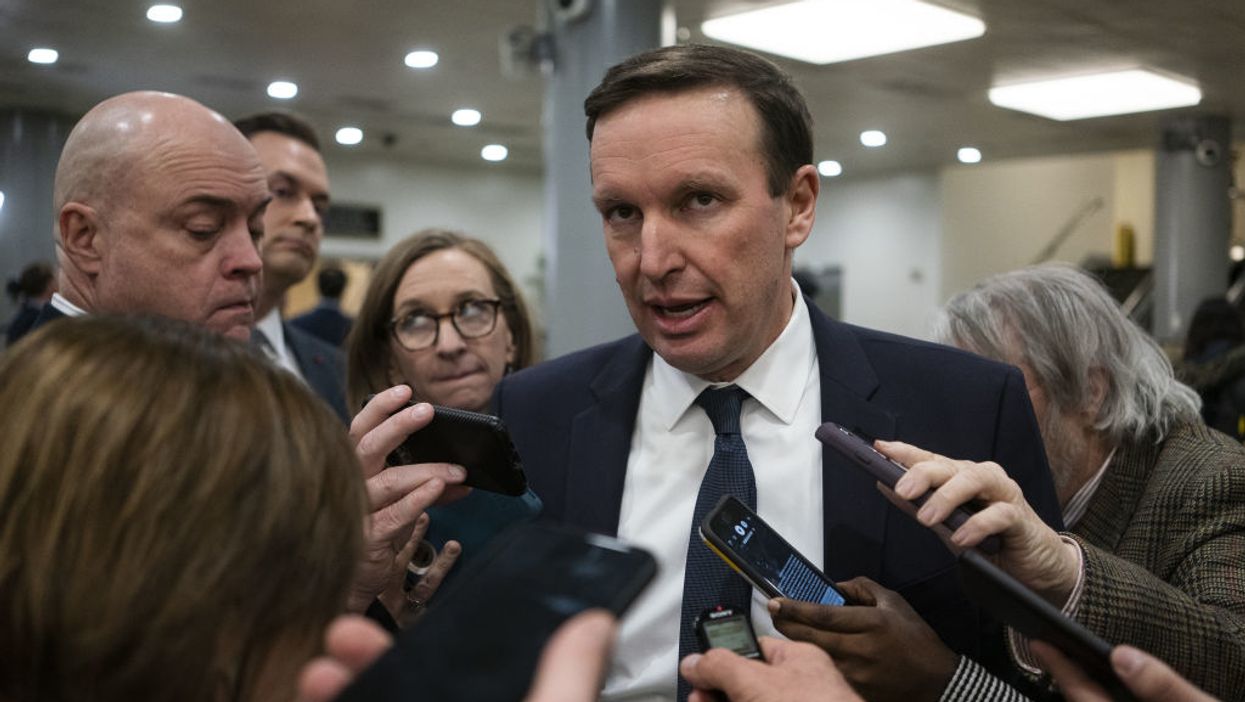
Alex Edelman/Bloomberg via Getty Images

What was he hoping to accomplish?
Sen. Chris Murphy (D-Conn.), hoping to quell speculation of wrongdoing, has formally responded to reports that he held a secret meeting with Iranian Foreign Minister Javad Ziraf last week. But his explanation may raise more questions than it answers.
The Federalist first reported Monday that Murphy and other Democratic senators held a "secret" meeting with Zarif last week at the annual Munich Security Conference. The news immediately began to circulate in the media and led to speculation as to whether Murphy had undermined U.S. foreign policy or even potentially violated the Logan Act by holding the meeting.
The Logan Act is a federal law that forbids unauthorized American citizens from negotiating with foreign governments in a dispute with the United States.
Tuesday morning, Secretary of State Mike Pompeo commented on the reports, seeming to scold Murphy and his Democratic colleagues for meeting with Zarif, who, Pompeo noted, is "the foreign minister of a country that killed an American on December 27" and "is the largest world sponsor of terror and the world's largest sponsor of anti-Semitism."
"If they met, I don't know what they said. I hope they were reinforcing America's foreign policy and not their own," Pompeo added.
Murphy had not commented on the news until late Tuesday morning when he published a behind-the-scenes account of his trip on Medium, along with additional thoughts in a brief Twitter thread.
In the senator's account, he said that he has "no delusions about Iran" and even characterizes Iran as an "enemy" and "adversary" of the United States. But he adds: "Discussions and negotiations are a way to ease tensions and reduce the chances for crisis," before concluding that "Trump, of course, has no such interests."
Then Murphy confirmed that the meeting happened and commented at length about its subject matter:
I plan to meet Zarif Saturday night in his hotel suite, and I have several goals for the meeting. First, I want to gauge whether he thinks the reprisals for the Soleimani assassination are over, and I want to make sure it is 100 percent clear to him that if any groups in Iraq that are affiliated with Iran attack the United States' forces in Iraq, this will be perceived as an unacceptable escalation. Zarif may not have control over Iran's military decisions, but he is the country's chief diplomat and I want him to know that our government is united on this point.
Second, I want his help in Yemen. I tell him that I know it is not a coincidence that the recent uptick in attacks from Iranian-aligned Houthis in Yemen started right after the Soleimani killing. I tell him that Iran shouldn't let the Houthis waste an opportunity for peace. Of course, he predictably tells me that it's the Saudis, not the Houthis, that are holding up progress on peace talks ...
... Lastly, I raise the issue of American prisoners held in Iran. He is ready for this inquiry — he already knows how much I care about releasing innocent Americans from custody — and we spend a few minutes discussing how the situation could be resolved.
A regular reading of Murphy's account could plausibly characterize the conversation as a negotiation. In a follow-up tweet, Murphy used words like "urged," "pressed," and "pushed" in describing his stance toward Zarif at the meeting.
"Congress is a co-equal branch to the executive. We set foreign policy too," he added in the Twitter thread, before acknowledging that "no one in Congress can negotiate with Zarif or carry official U.S. government messages."
In a concluding statement about the meeting in his account on Medium, Murphy seems to backpedal a bit, saying he's "just a rank and file U.S. Senator."
I don't know whether my visit with Zarif will make a difference. I'm not the President or the Secretary of State — I'm just a rank and file U.S. Senator. I cannot conduct diplomacy on behalf of the whole of the U.S. government, and I don't pretend to be in a position to do so. But if Trump isn't going to talk to Iran, then someone should. And Congress is a co-equal branch of government, responsible along with the Executive for setting foreign policy. A lack of dialogue leaves nations guessing about their enemy's intentions, and guessing wrong can lead to catastrophic mistakes.
Yet, one potentially troublesome line from the statement is Murphy's assertion that "if Trump isn't going to talk to Iran, then someone should."
Perhaps none of this would be a problem had Murphy been more forthright about the meeting and his motivations for holding it before it took place. TheBlaze reached out to Sen. Murphy's office, requesting comments regarding allegations that the meeting was conducted in secret and that it potentially violated federal law.
In an email response, the senator's communications director, Lia Albini, directed us to the Medium publication and Twitter thread cited above, but did not address the specific requests for comment.
So, in a follow-up email, TheBlaze pressed again for specific responses to whether the meeting was intended to be secretive and if the senator had thoughts about allegations that he violated the Logan Act. In addition, TheBlaze sought to know if other congressional colleagues were present with Murphy at the meeting.
Murphy's team did not respond to our request for comment in time for publication.